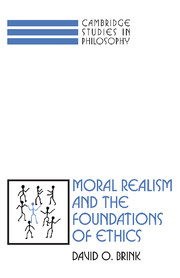Book contents
- Frontmatter
- Contents
- Preface
- 1 INTRODUCTION
- 2 MORAL REALISM AND MORAL INQUIRY
- 3 EXTERNALIST MORAL REALISM
- 4 DOES MORAL REALISM MATTER?
- 5 A COHERENTIST MORAL EPISTEMOLOGY
- 6 MORAL REALISM AND THE IS/OUGHT THESIS
- 7 A POSTERIORI OBJECTIONS TO MORAL REALISM
- 8 OBJECTIVE UTILITARIANISM
- Appendix 1 Must an infinite regress of justification be vicious?
- Appendix 2 Coherence, internalism, and externalism in epistemology
- Appendix 3 The is/ought thesis and intuitionism
- Appendix 4 Rawlsian constructivism
- Bibliography
- Index
Appendix 1 - Must an infinite regress of justification be vicious?
Published online by Cambridge University Press: 11 January 2010
- Frontmatter
- Contents
- Preface
- 1 INTRODUCTION
- 2 MORAL REALISM AND MORAL INQUIRY
- 3 EXTERNALIST MORAL REALISM
- 4 DOES MORAL REALISM MATTER?
- 5 A COHERENTIST MORAL EPISTEMOLOGY
- 6 MORAL REALISM AND THE IS/OUGHT THESIS
- 7 A POSTERIORI OBJECTIONS TO MORAL REALISM
- 8 OBJECTIVE UTILITARIANISM
- Appendix 1 Must an infinite regress of justification be vicious?
- Appendix 2 Coherence, internalism, and externalism in epistemology
- Appendix 3 The is/ought thesis and intuitionism
- Appendix 4 Rawlsian constructivism
- Bibliography
- Index
Summary
As we saw in Chapter 5, there are three strategies for incorporating the epistemological requirement that justifying beliefs be justified: (1) All justification is both linear and inferential; (2) although all justification is inferential, it is not all linear; and (3) although all justification is linear, it is not all inferential. Foundationalism represents (3), and the regress argument claims that foundationalism, and it alone, is an acceptable strategy. According to this argument, strategy (1) involves a vicious regress of justification, whereas strategy (2) involves a vicious circle of justification.
We saw that this argument fails. First, foundationalism is not an acceptable strategy; there are no noninferentially justified beliefs (5.5). Second, strategy (2) can be defended. By distinguishing between systematic and contextualist justification, we can see how coherentism can provide the correct account of systematic justification even if circular reasoning is generally inadmissible in contextualist justification (5.6).
It seems, however, to be generally agreed by both foundationalists and coherentists that the case made against strategy (1) by the regress argument is conclusive. I think this conventional wisdom is unfounded. If there is something wrong with (1), it is not what the standard objection alleges.
A VIRTUOUS REGRESS
I think it must be concluded that (1) can incorporate the epistemological requirement as it has been formulated only at the cost of an infinite and vicious regress. If any justifying belief must itself be justified, then, if, as (1) claims, all justification is inferential and linear, one can be justified in holding a belief p only if one holds and is justified in holding an infinite number of beliefs.
- Type
- Chapter
- Information
- Moral Realism and the Foundations of Ethics , pp. 291 - 295Publisher: Cambridge University PressPrint publication year: 1989



